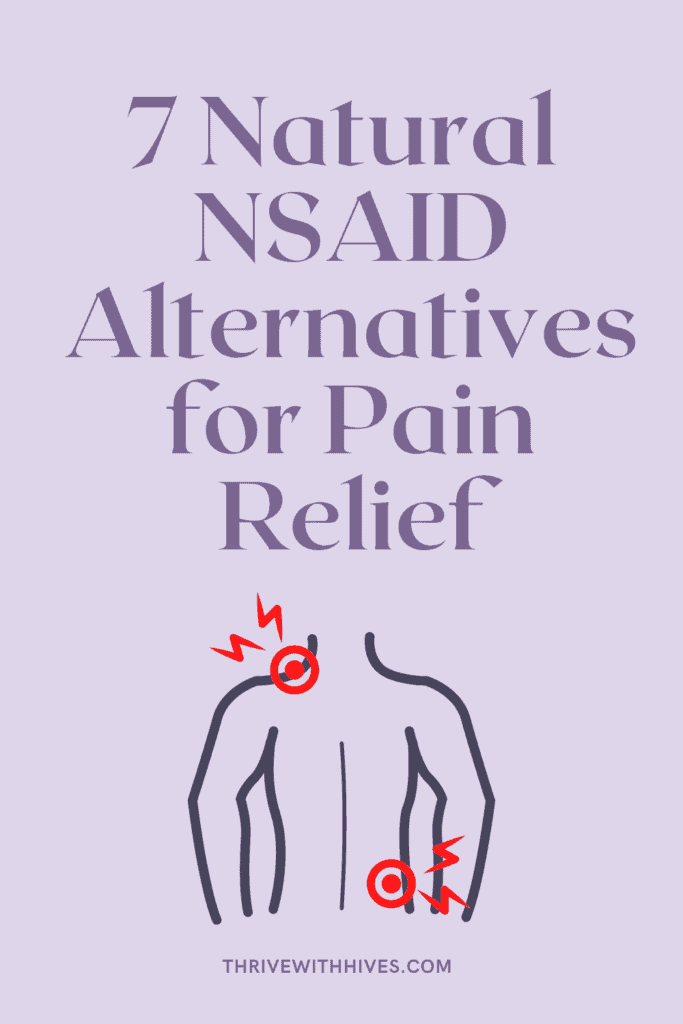7 Natural NSAID Alternatives for Pain Relief

If you are like me and have chronic pain, hearing that you must stay away from NSAIDs can be quite a blow. Here I will share with you 7 natural NSAID alternatives to reduce inflammation and ease your pain.
When I was first diagnosed with Chronic Idiopathic Urticaria (Now known as Chronic Spontaneous Urticaria) my immunologist told me to stop taking NSAIDs and avoid at all costs. Having suffered from chronic joint pain since I was a teenager I was quite unhappy with this. I tried to convince him otherwise. I told him how I had been taking them for years and have never had a reaction. To my dismay he couldn’t be persuaded.
He explained that all CIU (CSU) patients are recommended to avoid NSAIDs. He was very experienced in Chronic Urticaria management and he said that CIU (CSU) patients have a higher incidence of anaphylaxis with NSAIDs, even if we have been safely taking them before. I lost the debate and went home wondering how to manage my chronic pain without taking the NSAIDs that I had relied on for so long. Tylenol never cut it.
People who are diagnosed with Chronic Spontaneous Urticaria have increased inflammation in their bodies. This means we are more likely to suffer from chronic pain. So we have chronic pain due to inflammation but are advised not to take anti-inflammatory medications to ease our pain. Not to fret, let’s explore other options.
I am not a physician and nothing on this blog should be taken as medical advice. This is a general overview from my own research. As always you should check with your physician before making any changes to your treatment plan.
What are NSAIDs?
NSAID stands for Non Steroidal Anti Inflammatory Drugs. You have probably taken them numerous times for a fever, toothache, back ache, or headache. Some examples of common NSAIDS:
- Motrin (Ibuprofen, Advil)
- Naproxen (Aleve)
- Aspirin (Bufferin, Excedrin)
There are also prescribed forms of NSAIDs. Be sure to let your care team know if you cannot take NSAIDs.
NSAIDs work by blocking chemicals in the body that contribute to inflammation. This reduction in inflammation can also slow damage to body tissues in sports injuries or arthritis.
NSAIDs don’t come without risks or side effects. Taken long term, they can increase your risk of cancer, stomach ulcers, kidney damage. Even if you haven’t been advised to avoid NSAIDs, they aren’t meant to be taken long term and if your doctor prescribes them long term they should be evaluating you for potential issues that may arise.
Luckily, there are several natural NSAID alternatives we can turn to.
7 Natural NSAID Alternatives
As an Amazon Associate, I may earn a small percentage from products purchased through links on this site. I appreciate your support and would never link to something that I would not personally use.
1) Turmeric (Curcumin)
In addition to being a tasty ingredient in cooking, turmeric contains curcumin, which has been shown to have many benefits. Curcumin is the component of Turmeric that is known for it’s high levels of antioxidants and anti-inflammatory properties.
This study compared the use of Curcumin supplement with the NSAID Diclofenac for osteoarthritis pain and found it to be just as effective and with less side effects.
You can increase absorption of curcumins by taking with fats or oils and ground black pepper.
You can use Turmeric in cooking, drink Turmeric tea, or take Curcumin as a supplement.
Cautions: If you are sensitive to oxalates or have a history of kidney stones, you may want to pass on this one.
Turmeric can inhibit the absorption of iron so take away from any iron supplement. If you have anemia, check with your doctor.
Other Benefits:
- May protect against heart disease
- May help prevent and assist in treating cancer
- May help prevent diabetes
- May help delay or even reverse Alzheimer’s disease
- May help depression
- May improve skin health
- Protect you from cell damaging free radicals
- Anti-aging
- Prevent Eye degeneration
Do you see why I love turmeric so much?
Here are some turmeric curcumin supplements.
This is turmeric powder I buy in bulk and store in glass jars.
2) Garlic
Garlic is known for its strong flavor and resulting bad breath. But there are a lot of benefits to this pungent alum.
Garlic has long been used as a home remedy for toothaches and back pain. The anti-inflammatory properties found in garlic make it a great contender for replacing NSAIDs.
This study shows that garlic supplements may reduce pain in osteoarthritis patients.
You can take garlic supplements, make a topical paste, or just be sure to include a lot of garlic in your cooking.
Cautions: in addition to bad breath, garlic may cause burning if applied topically, may decrease clotting of the blood, cause stomach upset, or interact with certain medications. As always, check with your physician or pharmacist if you will be supplementing on a regular basis.
Other Benefits:
- May help blood pressure
- May help reduce cholesterol
- May help prevent heart disease
- May assist in fighting infections and allergies
- May increase endurance
- May help prevent osteoporosis
- May assist in prevention dementia
- May improve skin health
3) Cayenne Pepper
Cayenne pepper, in addition to adding spice to dishes, is known for its high content of capsaicin. Capsaicin is what gives hot peppers their spice. It has also been shown to have robust pain-relieving properties. Used topically or as a supplement.
Cautions: Use this one with caution when applied topically. Many of us with CSU have sensitive skin and I had chemical burns to both my knees from using an over-the-counter capsaicin pain relief cream. Do a small patch test on the inside of your forearm before using it on larger areas. Check with your doctor or pharmacist about possible interactions with medications you are taking.
Other benefits:
- May relieve migraine headaches
- May prevent blood clots
- May help psoriasis
- May help the immune system
- May help allergies
- May help prevent cancer
4) Ginger
Ginger is widely known as a home remedy for stomach ailments. Growing up, my grandma always prescribed us ginger ale when we had a stomach bug. I was surprised to learn that it is a great natural NSAID alternative as well.
This study shows that Ginger may be just as effective as Motrin in pain relief for arthritis.
This study shows that a topical ginger extract solution is effective in relieving arthritic knee pain.
Ginger is also shown to be effective in relieving menstrual pain.
You can use this ginger essential oil internally or topically.
Cautions: May increase the risk of bleeding. As always, check with your physician for possible medication interactions.
Other Benefits
- May support the immune system
- May protect against Alzheimer’s
- May prevent cancer
- May help relieve nausea
- May help lower cholesterol
- May help diabetes
- May protect against autoimmune disease
5) Thyme
Menstrual cramps? I always used to reach for Naproxen or Motrin for relief. Now instead of going to the medicine cabinet, you can make a cup of Thyme tea. or
Thyme essential oil can be taken internally as a supplement or topically diluted.
Thyme is one of my favorite natural NSAID alternatives for painful period cramps. This study shows that thyme oil was slightly better than Ibuprofen for easing menstrual pain.
In addition to cooking, use as a tea, a topical salve, or as a supplement.
Cautions: May slow clotting and interfere with some medications.
Other Benefits
- May lower blood pressure
- May boost your mood
- May relieve bronchitis symptoms
- May reduce risk of some cancers
6) Sage
Sage has anti-inflammatory and antioxidant components.
Clary Sage Essential oil– may be taken internally as a supplement. Always dilute with carrier oil and use topically. Patch test a small area on your inner forearm before applying to larger areas.
Like thyme and ginger, sage can be used to relieve menstrual pain.
Cautions: if used in large quantities, sage can interact with some medications. Check with your doctor if you plan on supplementing with sage.
Cautions: Similar to anti-histamines, it can be drying. Avoid if pregnant or breastfeeding. Avoid if you are suffering the drying effects of antihistamines.
As always, check with your doctor if you plan to take sage regularly as it may interfere with some medications.
Do not take more than recommended dose.
Other Benefits
7) Bromelain Extract
Bromelain is an enzyme found in Pineapples. It has been shown to have anti-inflammatory and analgesic properties, making it a great natural alternative to NSAIDs. It may be useful for sports injuries as well as chronic pain like osteoarthritis and rheumatoid arthritis. HERE is a review of studies about Bromelain for pain.
Eating a lot of pineapples probably won’t cut it. Bromelain is concentrated heavily in the core. Bromelain is available as a capsule, topical cream. or even powder.
Cautions: If you are allergic to Pineapples, bromelain isn’t for you. As always, check with your physician or pharmacist for possible drug interactions. Bromelain has the potential to interact with some antibiotics and blood-thinning medications. Let your doctor know you are taking bromelain if you are having surgery, as it may thin the blood.
Other Benefits
- May prevent cancer
- May help digestive disorders
- May help allergies and asthma
- May help prevent and treat sinusitis
This one includes Quercetin, which has been shown to be beneficial for allergies as well.
As you can see, there are many options available to us as natural NSAID alternatives. Have you tried any of these? Let us know if it helped.
For myself, turmeric and ginger along with an anti-inflammatory diet have helped reduce my chronic pain significantly.
Don’t forget that even natural supplements can be harmful if taken incorrectly. Please seek the guidance of your care team before adding supplements to your daily routine. I always recommend working with a functional medicine or integrative care team alongside your primary physician and specialists.
Want more? Join my mailing list for updates and receive a free guide on 5 key strategies to thrive with hives.
I hope that this list was helpful and you find relief from your pain.

I love your list of food with anti-inflammatory properties. I am a huge fan of healthy food because it supports health. Probably alkaline diet is also great for inflammation. I am sure many people will benefit from your list. Thank you for your valuable tips!
Great to know about these NSAID alternatives to avoid more problems!